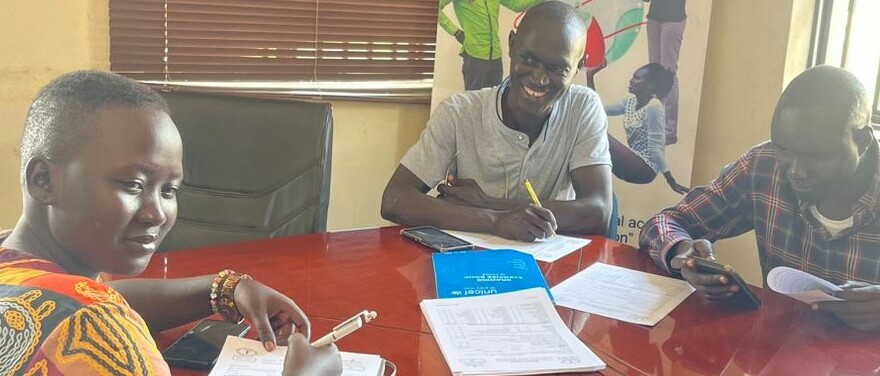The Union of Journalists of South Sudan (UJOSS) on Wednesday mobilized dozens of its members to donate blood at the National Blood Centre in Juba.
UJOSS President Oyet Patrick Charles, who led the exercise, told Radio Tamazuj that journalism today was not just about reporting the lack of blood in hospitals, but rather a collective responsibility for everyone to save lives.
UJOSS said 17 members, six females and 11 males, donated blood on Wednesday, with each person providing 400 milligrams (400Ml).
“Journalism is changing. It is no longer enough for us to just report that there is a lack of blood or people need blood and the blood is not there,” Oyet remarked.
“There are things that we can do which do not really affect our profession and ethics. Therefore, we ask our members to do them. It is important to know that we are part of the society and let us do those things that do not affect our profession, even planting trees.”
The Director General at the National Ministry of Health, Dr Lul Lojok, said that South Sudan’s 12 million population needed 120,000 units of blood annually, to save 12 million lives.
“Our population is estimated to be 12 million people, and that means that we need 120,000 units of blood annually. Juba is estimated to be 500,000 people and this means we need 5,000 units of blood to save lives in Juba,” he said.
A journalist from Capital FM in Juba, Anikang Sasha, told Radio Tamazuj after donating blood that there was a need for more blood donors.
“It is actually my first time to donate and at first I was nervous because of some stories that people hear about donations,” she said.
“What really made me to go was when one person walked in and was asking for blood Group O+ as I was conversing with the medical personnel. I felt there was much need for us to donate. It was just at 10am that someone came and said there were already 15 people who needed blood,” she explained.
“There is a process that you go through. First, they weigh you, take your blood pressure, they check whether you have enough blood or whether you are able to donate. If you don’t have enough blood or you are sick, there is no way they will allow you to donate,” she further explained.
The South Sudan Red Cross representative, Joseph Lukak Charles, lauded UJOSS for the initiative.
“I am very happy that the Union of Journalists of South Sudan has taken this initiative of donating blood. The South Sudan Blood Bank receives less than 5,000 units of blood. Let us agree to have an annual event between the Union of Journalists and the Ministry of Health and South Sudan Red Cross to encourage blood donation,” he said.
The coordinator for the Sustainable Agency for Empowerment (SAFE), David Awule, said there was a need to liaise with journalists to encourage blood donation and enable proper messaging to the public.
“We have issues to do with blood donation, but how do we tackle that? So we are like, why don’t we start with some of the most powerful people in our communities like journalists, because there are a lot of misconceptions going around and people are fearing to donate,” he said.
“When we start with journalists, they will be able to go to the televisions and radio stations and newspapers and talk about the importance of donating blood. We are seeing everyday people dying due to lack of blood following accidents and we thought it is okay to mobilize journalists through UJOSS.”
A nurse at the South Sudan National Blood Bank, Yom Michael, dismissed the claims of the sale of blood to patients.
“Blood donation is voluntary and does not involve payment of money. Blood donation saves lives,” she stated.
South Sudan will on June 14, 2024, join the rest of the world to commemorate the World Blood Donor Day, themed: “20 Years of Celebrating Giving, Saves Lives”.




